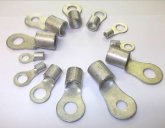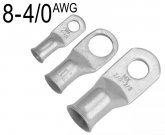You are using an out of date browser. It may not display this or other websites correctly.
You should upgrade or use an alternative browser.
You should upgrade or use an alternative browser.
Where is all the quality wire, connectors ?
- Thread starter AzTonopah
- Start date
I buy tinned wire from marine suppliers. The Chinese approach is look at something ,copy it but try to use cheaper materials and design then sell it just under the previous price .
Have you noticed how your feet have been growing in chinese shoe terms over the years ? Each size gets a bit smaller each year.
Have you noticed how your feet have been growing in chinese shoe terms over the years ? Each size gets a bit smaller each year.
I buy tinned wire from marine suppliers. The Chinese approach is look at something ,copy it but try to use cheaper materials and design then sell it just under the previous price .
Have you noticed how your feet have been growing in chinese shoe terms over the years ? Each size gets a bit smaller each year.
Last edited:
D
Deleted member 783
Guest
Thank youI buy Spartan Power cables. They are made in the USA (assuming you are too based on your username), and are top quality.
View attachment 3429
Santa
.
- Joined
- Nov 10, 2019
- Messages
- 612
I went to the company's website. You can buy different lengths, lug sizes, etc. Thanks! Anything to not use Amazon.I buy Spartan Power cables. They are made in the USA (assuming you are too based on your username), and are top quality.
View attachment 3429
D
Deleted member 783
Guest
I just found these lugs thanks to @JeepHammer. I'll be using these from now on:
Non-Amazon link for Santa:
Non-Amazon link for Santa:
The terminal end in that picture is a TERRIBLE cheapo acid or moisture environment fail waiting to happen...I buy Spartan Power cables. They are made in the USA (assuming you are too based on your username), and are top quality.
View attachment 3429
D
Deleted member 783
Guest
The terminal end in that picture is a TERRIBLE cheapo acid or moisture environment fail waiting to happen...
Dang, really? They advertise as heavily tinned copper. Isn't that what you want?
D
Deleted member 783
Guest
Oh, you must be talking about the crimp I just noticed.
The end of the terminal is open... so, unless the wire is tinned, acid or salt can degrade the wire.Dang, really? They advertise as heavily tinned copper. Isn't that what you want?
D
Deleted member 783
Guest
The end of the terminal is open... so, unless the wire is tinned, acid or salt can degrade the wire.
I spent some bucks on 4/0 from them. I'll have to examine that when I get home. Another day, another pile of dollars wasted on crap...
As long as not near acid or saltwater, they will be fine.I spent some bucks on 4/0 from them. I'll have to examine that when I get home. Another day, another pile of dollars wasted on crap...
Maybe seal the ends with grease?
D
Deleted member 783
Guest
As long as not near acid or saltwater, they will be fine.
Maybe seal the ends with grease?
If they look like that, should I just re heat shrink right over them? They are inside and will never be near saltwater or acid, unless the batteries explode.
Justin Laureltec
Bay Marine Supply Tech Support Manager
FYI, ^^that^^ Amazon link is our listing, those are all sold by us (we're Mobile Power Pros and Bay Marine Supply on Amazon), so if you want those FTZ lugs and/or marine-grade wire without using Amazon, you can order the same components directly from our web site.
D
Deleted member 783
Guest
FYI, ^^that^^ Amazon link is our listing, those are all sold by us (we're Mobile Power Pros and Bay Marine Supply on Amazon), so if you want those FTZ lugs and/or marine-grade wire without using Amazon, you can order the same components directly from our web site.
I'm going to be making all my own cables from now on, and I will be visiting your website soon!
Justin Laureltec
Bay Marine Supply Tech Support Manager
For reference, these are what proper crimps should look like (before shrink tubing). This little cable (demoing the difference between the FTZ Heavy Duty lug on the left side and FTZ Starter Lug on the right side of the first pic) is about 6 years old and our wholesale manager, who is well over 300 lbs, can still hang off it and do pull-ups... not that anyone will be doing that, but the rule of thumb in heavy-gauge wiring is that if you can't apply at least 100lbs of pull to your crimps without them moving, you don't have good crimps.
Note the proper 4-sided crimp (with an FTZ bench-mount Correct-Crimp) and the closed-end lugs (it's all tinned marine wire anyway, but still). Never settle for crap.
Note the proper 4-sided crimp (with an FTZ bench-mount Correct-Crimp) and the closed-end lugs (it's all tinned marine wire anyway, but still). Never settle for crap.
Attachments
Santa
.
- Joined
- Nov 10, 2019
- Messages
- 612
I had links already from JeepHammer for lugs, I don't need any links thanksI just found these lugs thanks to @JeepHammer. I'll be using these from now on:
Non-Amazon link for Santa:
PHoganDive
Solar Enthusiast
It is more than a conductivity improvement.
Soldering can obviously increase the contact of a weak crimp job, it cuts through the oxidation layer of the metal, and seals out further oxidation. It also adds mass to the joint to absorb heat.
a properly treated, crimped and sealed physical joint is superior to a soldered joint, because the strands do not get heated, etc... but us mere mortals don’t have the skills or tools to achievethis.
Solder improves many poor crimped connections, and even though there is a conductivity loss over pure copper, the improvements outweigh them over time from an otherwise degradation issue...
Soldering can obviously increase the contact of a weak crimp job, it cuts through the oxidation layer of the metal, and seals out further oxidation. It also adds mass to the joint to absorb heat.
a properly treated, crimped and sealed physical joint is superior to a soldered joint, because the strands do not get heated, etc... but us mere mortals don’t have the skills or tools to achievethis.
Solder improves many poor crimped connections, and even though there is a conductivity loss over pure copper, the improvements outweigh them over time from an otherwise degradation issue...
I think once you guys start to solder your closed ended terminal, you won't look back! Been building cables that way for years. They run much cooler with the huge conductivity improvement.
Just note that cables soldered with normal DIY solder used outdoors deteriorate VERY quickly.
Silver solder is the solution here I believe.
To be honest I just crimp most often now and cover with glue backed shrink tubing.
What would you call "normal" solder?Just note that cables soldered with normal DIY solder used outdoors deteriorate VERY quickly.
Silver solder is the solution here I believe.
To be honest I just crimp most often now and cover with glue backed shrink tubing.
Electronic rosin core?
Acid core?
Plumbing lead solder?
Lead free?
95/5 tin/antimony?
ghostwriter66
"Here - Hold my Beer"
Just note that cables soldered with normal DIY solder used outdoors deteriorate VERY quickly.
Silver solder is the solution here I believe.
To be honest I just crimp most often now and cover with glue backed shrink tubing.
At work we are required to solder - then crimp - then heat/shrink tubing ... BUT for my stuff -- I just do like you -- crimp and heat/shrink ... NONE of my cables are under stress so not concerned about them pulling apart ...
Similar threads
- Replies
- 11
- Views
- 717
- Replies
- 13
- Views
- 601
- Replies
- 35
- Views
- 1K
- Replies
- 0
- Views
- 128







